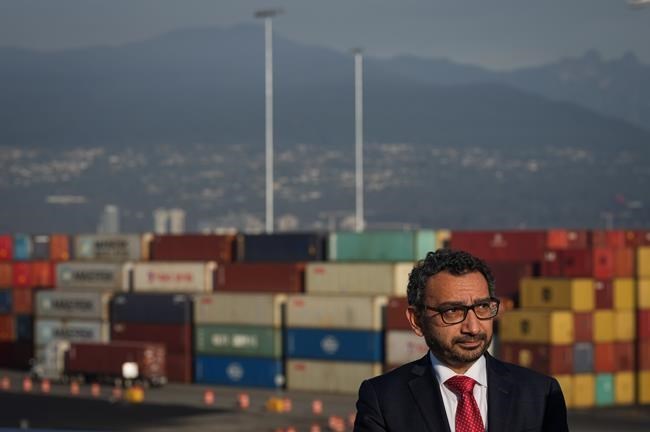OTTAWA — Four federal Liberal MPs have written to Transport Minister Omar Alghabra expressing frustration with a much-criticized program that aims to replace older trucks servicing the Port of Vancouver.
The MPs' letters come amid heavy criticism of the Rolling Truck Age Program, which aims to phase out trucks that are more than 12 years old to improve air quality and community health.
The Vancouver Fraser Port Authority put the onus on independent owners and operators to replace the vehicles.
Truckers have raised concerns about steep costs, saying that existing vehicles already meet emissions standards and global supply-chain issues are making the transition more difficult.
The port said the program has been delayed twice since its initial introduction in 2022 to give companies more time to implement the new rules. It is now set to come into effect April 3.
A letter from Surrey, B.C., MP Randeep Sarai says he has met with truckers who have complied with the new measures but still find it unreasonable and worry about the requirement to replace more vehicles from their fleets down the road.
Other Liberal MPs from the area, including Sukh Dhaliwal, Parm Bains and John Aldag, sent similar letters to Alghabra.
Dave Earle, president and CEO of the British Columbia Trucking Association, played down the concerns, saying that everyone knew these changes were coming and owners and operators of trucks have had ample opportunity to comply.
Those that chose to wait are the ones facing the higher cost of trucks and limited availability, he said.
"I talked to one of the MPs that sent that letter on the weekend. I said, 'It was unfortunate (you) didn't come talk to us before you sent it, because you don't have the data. You don't have the information,'" said Earle.
To date, about 80 per cent of 1,800 container trucks in the port have conformed to the new requirement, the Port of Vancouver said in a September press release.
The port has also said that once trucks that were built prior to 2009 have been removed, it expects to see a reduction of about 15,000 tonnes of greenhouse gases being released each year, including 575 tonnes of smog-forming nitrogen oxide and 37 tonnes of carcinogenic particulate matter.
Those who oppose the program say they are still waiting for a conversation with the port authority.
"We are ready to have a nice conversation with the Port of Vancouver," said Gagan Singh, a spokesperson for the United Truckers Association, which represents operators in the Vancouver area.
But the federal agency responsible for the port has lost the "trust" of truckers," he said. "People don't have any faith in them anymore."
Singh said the group wants Transport Canada to intervene and act as a mediator for its members' conversations with the agency.
Dhaliwal, who mentioned in his letter that he attended the association's annual general meeting, said that Alghabra has been "very diligent" in supporting a dialogue between the port authority and the truckers.
But nothing has yet come out of that process, he said in an interview. He said he believes the program should be scrapped altogether, at least for the moment.
A spokesperson for Alghabra said he has been in contact with the Port of Vancouver about the issue.
"Minister Alghabra has written to the port twice asking them to work with the trucking industry and find a solution regarding the program to ensure the recovery of our supply chains, amid labor shortages as a result of the COVID-19 pandemic," said press secretary Nadine Ramadan.
The agency that governs the port operates at an arm's length from government and is run by a board of directors that includes representatives of port users and all three levels of government. The federal government can't direct its policy.
The port authority did not respond to a request for comment before deadline.
This report by The Canadian Press was first published Feb. 22, 2023.
Maya Riachi, The Canadian Press



